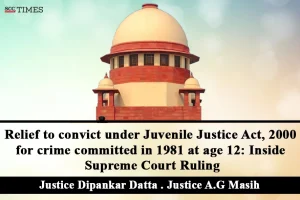Supreme Court: While considering the writ petition filed by a murder convict who was in custody from 3 years, and thus sought release from prison after raising the plea of juvenility; the Division Bench of Dipankar Datta* and A.G, Masih, JJ., had to consider whether the petitioner (convict) is entitled to the benefit of the Juvenile Justice (Care and Protection of Children) Act, 2000, as amended in 2006 whereby Section 7-A was inserted.
Perusing the undisputed fact that the convict was a juvenile in 1981 when the crime was committed, the Court opined that no provision in Children Act, 1960 was brought to Court’s notice that creates a legal impediment and, thus, limits Supreme Court’s authority to grant relief to the convict under Juvenile Justice Act, 2000. Therefore, as per Section 7-A of the JJ Act, the Court pointed out that the convict’s liberty was curtailed in breach of Article 21 of the Constitution. Thus, the convict was released after languishing in prison for 3 years.
The date of birth of the petitioner (convict) was 10-6-1969. It was alleged that the convict along with 5 others had assaulted the father of the first informant with knife and lathis, in November 1981. The victim succumbed to his injuries and the convict was arrested. He was however released in December 1981. The convict and the co-accused were tried by the Special Additional Sessions Judge, Sultanpur, in Sessions Trial wherein it was found that the convict and co-accused were guilty of murder of the victim.
The Sessions Court having noted that the convict was 16 years old at the time of trial, held that he was entitled to the benefit of the Children Act, 1960. Accordingly, instead of sending the convict to jail, he was directed to be kept in a children’s home in accordance with the provisions of the 1960 Act to give him a chance to reform himself.
The conviction was challenged before Allahabad High Court wherein the all the appellants were acquitted. State of UP appealed before the Supreme Court and thereafter in 2009 the order of acquittal was reversed and conviction and sentence imposed by the Sessions Court was restored. The Supreme Court also restored the order of the Sessions Court qua the convict. The convict absconded and was later arrested in 2022.
Court’s Assessment:
Perusing the matter, the Court pointed out that Section 7-A was inserted in the Juvenile Justice (Care and Protection of Children) Act, 2000, via Amendment Act 33 of 2006 and deals with the procedure to be followed when claim of juvenility is raised before any court.
The Court noted that the convict was 12 years 5 months old on the date of the incident. In the absence of any specific role played by the convict, the Sessions Court recorded conviction by taking aid of Section 149 of the IPC, i.e., he was member of an unlawful assembly which perpetrated an act in furtherance of a common object and, therefore, would be liable thereunder.
The Court pointed out that the convict has suffered incarceration for more than the period permissible in law. Moreover, the purpose for which the Sessions Court directed the convict to be kept in a children’s home is no longer feasible now.
The Court pointed out that the proviso to Section 9(2) of the Juvenile Justice (Care and Protection of Children) Act, 2015 is the new avatar of Section 7-A of the JJ Act, 2000. Section 7-A of the JJ Act, 2000, which permits raising of a plea of juvenility in any court at any stage and even after final disposal of a special leave petition under Article 136 of the Constitution.
The Court explained that as per Section 7-A of the JJ Act, 2000, the Courts are under an obligation to consider the plea of juvenility and to grant appropriate relief if, at all, in an enquiry it is found that the convict was a juvenile on the date of offence.
The Court pointed out that in the present case, the convict’s date of birth and his age as on date of the offence are not disputed by the respondent and, thus, no enquiry is needed to ascertain his age. Therefore, the convict having been behind bars for more than 3 years, his liberty has been curtailed not in accordance with procedure established by law. Breach of the right guaranteed by Article 21 is writ large and, hence, the benefit of release from detention ought to be extended to the petitioner.
Therefore, the Court directed immediate release of the convict.
[Hansraj v. State of U.P., 2025 SCC OnLine SC 2193, decided on 9-10-2025]
*Judgment authored by Justice Dipankar Datta
Advocates who appeared in this case:
For Petitioner(s): Mr. Parinav Gupta, Adv. Mr. Pardeep Gupta, Adv. Mrs. Mansi Gupta, Adv. Mr. Rakshit Rathi, Adv. Mr. Anuj Kumar Garg, Adv. Dr. Mrs. Vipin Gupta, AOR
For Respondent(s): Mr. Rohit K. Singh, AOR Mr. Neeraj Shekhar, Adv. Mr. Yashveer Singh, Adv. Mr. Shivansh Pundir, Adv.


